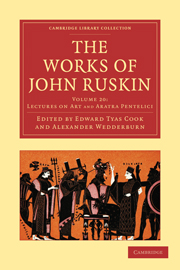Book contents
- Frontmatter
- Contents
- LIST OF ILLUSTRATIONS
- INTRODUCTION TO THIS VOLUME
- LIST OF RUSKIN'S OXFORD LECTURES DURING HIS FIRST TENURE OF THE SLADE PROFESSORSHIP (1870—1878)
- PART I “LECTURES ON ART” (INAUGURAL COURSE DELIVERED AT OXFORD IN HILARY TERM, 1870)
- PART II “ARATRA PENTELICI” (SIX LECTURES ON THE ELEMENTS OF SCULPTURE, DELIVERED AT OXFORD IN MICHAELMAS TERM, 1870)
- APPENDIX: LECTURES AND NOTES FOR LECTURES ON GREEK ART AND MYTHOLOGY (1870)
- I “THE STORY OF ARACHNE”: A LECTURE DELIVERED AT WOOLWICH, DECEMBER 13, 1870
- II “THE TORTOISE OF AEGINA”: AN UNDELIVERED LECTURE IN CONTINUATION OF “ARATRA PENTELICI”
- III “THE RIDERS OF TARENTUM”
- IV “THE EAGLE OF ELIS”
- V GREEK AND CHRISTIAN ART: AS AFFECTED BY THE IDEA OF IMMORTALITY
- VI SOME CHARACTERISTICS OF GREEK ART IN RELATION TO CHRISTIAN
- Plate section
II - “THE TORTOISE OF AEGINA”: AN UNDELIVERED LECTURE IN CONTINUATION OF “ARATRA PENTELICI”
Published online by Cambridge University Press: 07 September 2011
- Frontmatter
- Contents
- LIST OF ILLUSTRATIONS
- INTRODUCTION TO THIS VOLUME
- LIST OF RUSKIN'S OXFORD LECTURES DURING HIS FIRST TENURE OF THE SLADE PROFESSORSHIP (1870—1878)
- PART I “LECTURES ON ART” (INAUGURAL COURSE DELIVERED AT OXFORD IN HILARY TERM, 1870)
- PART II “ARATRA PENTELICI” (SIX LECTURES ON THE ELEMENTS OF SCULPTURE, DELIVERED AT OXFORD IN MICHAELMAS TERM, 1870)
- APPENDIX: LECTURES AND NOTES FOR LECTURES ON GREEK ART AND MYTHOLOGY (1870)
- I “THE STORY OF ARACHNE”: A LECTURE DELIVERED AT WOOLWICH, DECEMBER 13, 1870
- II “THE TORTOISE OF AEGINA”: AN UNDELIVERED LECTURE IN CONTINUATION OF “ARATRA PENTELICI”
- III “THE RIDERS OF TARENTUM”
- IV “THE EAGLE OF ELIS”
- V GREEK AND CHRISTIAN ART: AS AFFECTED BY THE IDEA OF IMMORTALITY
- VI SOME CHARACTERISTICS OF GREEK ART IN RELATION TO CHRISTIAN
- Plate section
Summary
1. The reign of Pheidon, King of Argos, referred by Mr. Grote—probably—“to the period a little before, and a little after, the 8th Olympiad,—between 770 and 730 B.C.,” will give, I think, at once a land-mark, and a sea-mark, from which we may always begin our study of Historic Greece, as opposed to Mythic Greece. I suppose everything is known more clearly now than in my undergraduate days, and I need hardly press on you the importance of this eighth century, and the beginning, in the two peninsulas, almost in the same year, of the powers of Greece and Rome.
Pheidon is said to have marched to Olympia 747 B.C., and celebrated the games there himself, as the lineal descendant of Herakles. Recollect, then, we have the actual historic king celebrating the games as the descendant of the God. And real history begins.
2. Pheidon of Argos—I now use Mr. Grote's words—“first coined both copper and silver money in Aegina;” and he presently adds:—“The first coinage of copper and silver money is a capital event in Grecian history.” It is so, and in wider history than that of Greece. “First coined,” that is to say, divided into given weights, and stamped these weights that they might be of all men known. These weights chosen by Pheidon were Babylonian, approximating closely to those of the Hebrews, Phoenicians, and Egyptians; but first, probably, determined by “the Chaldæn priesthood of Babylon.”
- Type
- Chapter
- Information
- The Works of John Ruskin , pp. 381 - 389Publisher: Cambridge University PressPrint publication year: 2010First published in: 1905



